Ah, Turkey – The bridge between East and West, where Europe meets Asia, and where ancient ruins cozy up to bustling bazaars.


But before you pack those bags and head on a journey of a lifetime, buckle up for a crash course (minus the crash) on what to expect when you step foot on Turkish soil for the first time.
These 25 Essential Turkey Travel Tips will tell you everything you need to know before planning a trip to this beautiful country for the first time.
What is Turkey famous for?
If we’re boiling it down (like a good Turkish tea), the country of Turkey is renowned for its rich history, majestic landmarks like the Hagia Sophia and the Blue Mosque, and its prime position bridging Europe with the Middle East.
Culture & History
For many, the best thing is the medley of cultures, where ancient traditions merge seamlessly with modern vibes, especially in major cities. And hey, if you haven’t considered a hot air balloon ride over the lunar landscapes of Cappadocia, trust me – it’s been on everyone’s Instagram feed for good reason.
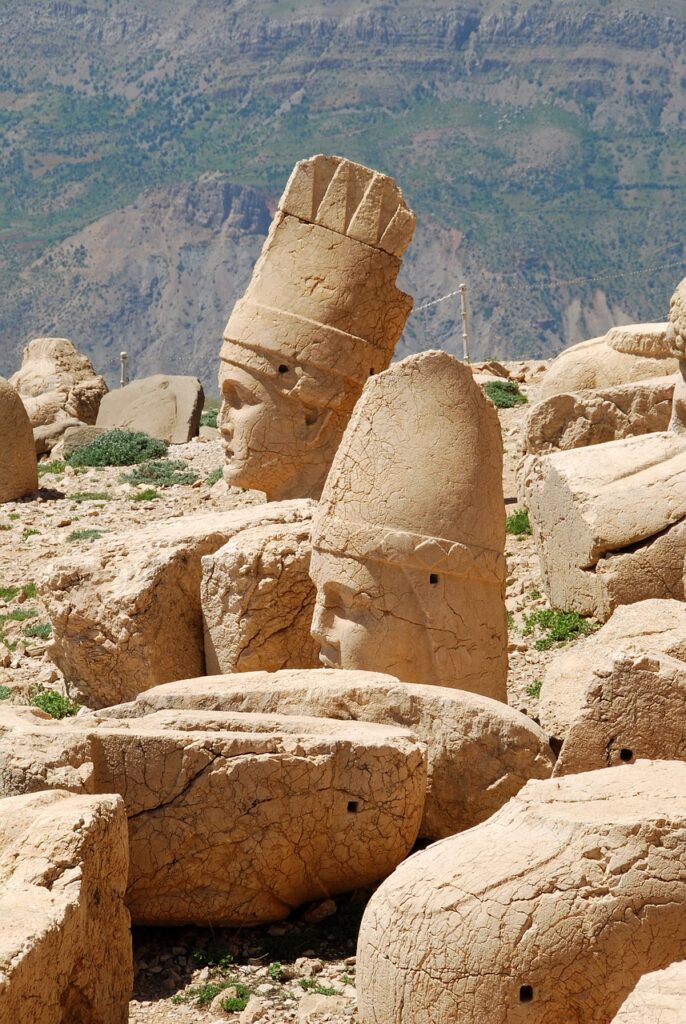







But let’s dive a little deeper, shall we? Imagine taking a road trip through time, where every pit stop offers a snapshot of eras gone by. From the vestiges of the Ottoman Empire to the echoes of the Byzantine epoch in Istanbul’s architectural wonders – it’s a bit like stepping into a living, breathing history book.
Food
And, oh boy, the Turkish cuisine! If you haven’t daydreamed about biting into a piece of baklava, you’ve got some pre-trip homework to do. Turkey is also the birthplace of many famous foods like Doner Kebab, Smit, and (of course) Turkish Delight. I could go on and on about the delicious food scene in Turkey, but I’ll save that for another post. But trust me, a trip here is worth it for the food alone!
Diverse regions
And then there’s the palette of places. Beach lovers, rejoice! The Aegean coast boasts some of the best beaches, while adventurers might gravitate towards eastern Turkey for a touch of the wild. In recent years, Turkey has also seen a surge in popularity among travelers, and why wouldn’t it? From beautiful beaches to mouthwatering street food and the fragrant waft of Turkish coffee – it’s a sensory carnival!
⚡ Related Read: Is Istanbul Safe? Common Scams & Safety Tips for Travelers
25 Essential Things to Know Before Going to Turkey
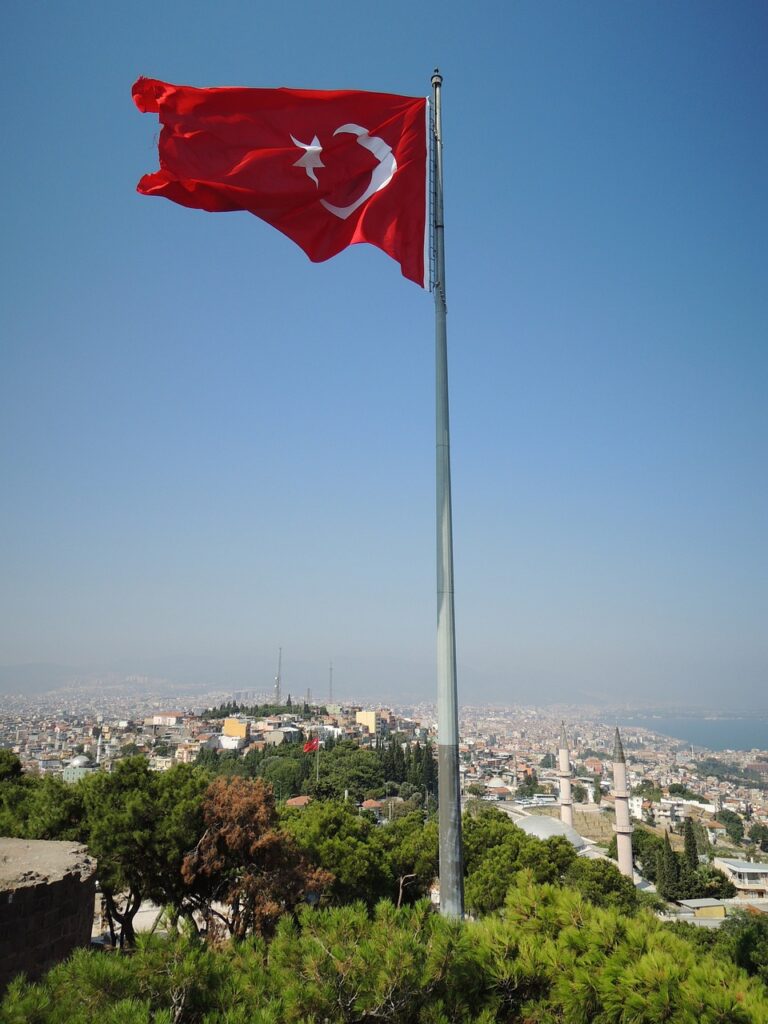



1. Turkey actually crosses two continents
Pop quiz! Name one city that gets to have its cake (or should we say baklava?) and eat it too? Yep, it’s Istanbul.
While most major cities can’t decide on which café is the best for brunch, Istanbul is busy straddling both Europe and Asia. And you thought deciding on where to have breakfast was tough! This geographical marvel is split by the Bosphorus Strait.
So, technically, you could enjoy a Turkish breakfast in Europe and top it off with some black tea in Asia, all before noon! If that’s not the best way to start your day, I don’t know what is. But keep your travel insurance handy, just in case you trip crossing continents – we wouldn’t want that, now would we?
2. Language
Merhaba! That’s “hello” in Turkish, and it’s probably one of the first words you’ll hear when you land.
While the vast melody of the Turkish language may initially sound like a hit song you can’t get out of your head, you’ll soon find its rhythm endearing. The official lingo here is, you guessed it, Turkish. And while navigating the touristy parts of Istanbul or Antalya, you’ll find many speak a fair amount of English.
But here’s a pro-tip: you will win hearts instantly by peppering your conversations with a few Turkish words.
Even if you mess up and accidentally order five kebabs instead of one (is that really a mistake though?), locals will appreciate your efforts. After all, who can resist a traveler trying to ask for “more baklava, please” in broken Turkish?
So, go ahead and add a dash of “teşekkür ederim” (thank you) here and a sprinkle of “evet” (yes) there. It’s the best way to dive headfirst into the authentic Turkish experience.
3. Currency
Cha-ching!
When it comes to spending your hard-earned moolah in Turkey, you’ll be dealing with the Turkish Lira (TRY). These colorful notes with images of prominent historical figures might feel like Monopoly money, but trust me, they’re your ticket to all things scrumptious and shiny in local bazaars.




While Turkey loves its Lira, it’s not dismissive of the mighty credit card. Big cities and most tourist spots roll out the red carpet for Visa and MasterCard.
But if you’re venturing off the beaten path or diving into the world of street food and souvenirs, cash is king. So, keep some notes tucked away for those impromptu ice creams or that irresistible handwoven rug you just have to take home.
4. Visa and Entry
So, you’ve packed your bags, learned some choice Turkish phrases, and you’re all set to embark on your Turkish journey. But wait, can you actually enter the country? That’s where the visa dance begins.
Depending on your nationality, you may need a visa to enter Turkey. Some can waltz right in, while others may need to do a bit of paperwork cha-cha beforehand.
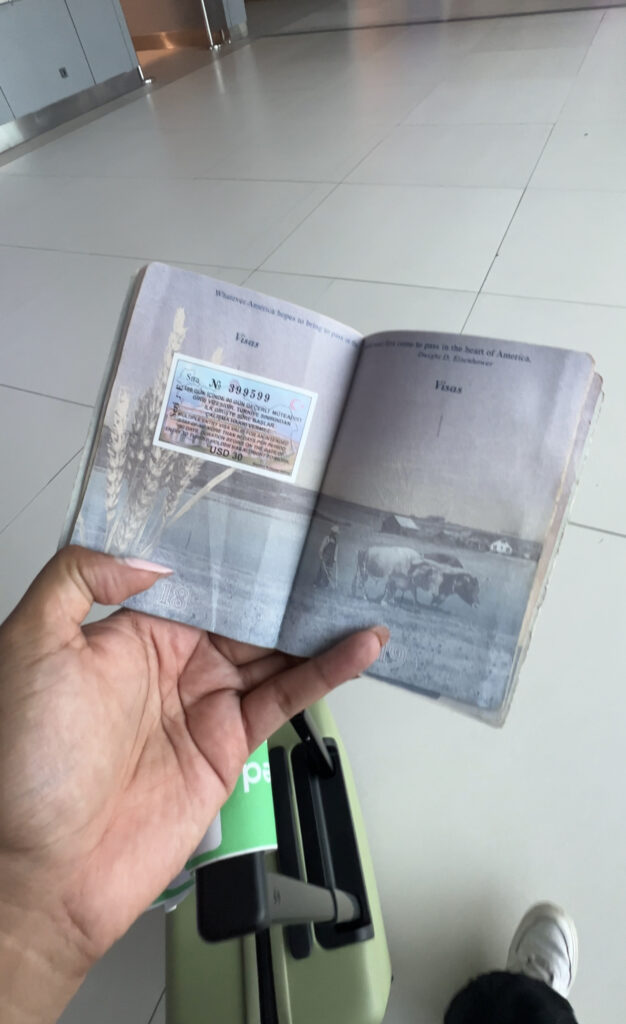



Always – and I mean always – check the visa requirements well in advance. The official Turkish government website or your home country’s embassy site are great places to start.
And if you find out you need one, don’t fret. The process is usually straightforward, and many nationalities can even get an e-visa online. Just ensure all your travel plans are in line with visa guidelines. Remember, nobody wants to be that person who planned their entire vacation only to get stuck at the Istanbul airport sipping (albeit delicious) Turkish tea. Do your homework before you book!
💡 Note: Americans, for example, will need a visa to visit Turkey. It can be purchased online as an e-visa or at the airport on arrival, and is valid for a maximum 90-day stay in Turkey.
5. Culture and Etiquette
Turkey is a place where rich history meets warm-hearted folks and the vibes are just right. Turkish people are like that perfectly brewed cup of Turkish coffee – warm, inviting, and sure to leave an impression. When you step foot in this beautiful land, you’ll be embraced by their legendary hospitality.
But, like attending any great party, there are some house rules to follow. Visiting a mosque, for instance? Think of it like going to someone’s home. Dress modestly, covering up those sun-kissed shoulders and knees. Those stylish shoes? Leave them at the door. It’s tradition (and just plain politeness) to take your shoes off when entering someone’s home in Turkey, and especially so in a place of worship.
And ladies, you might need to don a headscarf; think of it as the cherry on top of your cultural immersion sundae. An open mind, paired with a sprinkle of respect for local customs, will truly be your best travel buddy. So, when in Turkey, do as the Turks do. Dive deep into the culture, and who knows, you might even find yourself partaking in a traditional dance in the surrounding area of a beach resort!
6. Religion
At the heart of Turkey’s vibrant cultural tapestry lies its deep-rooted religious heritage. With the majority of its population identifying as Muslim, Islam plays an intrinsic role in shaping the nation’s traditions, customs, and daily life.
As you explore Turkey, you’ll find yourself amidst a rhythmic dance of faith that resonates from the bustling streets of Istanbul to the tranquil Aegean coast. Central to this rhythm is the Azan, the call to prayer that reverberates from mosque minarets throughout the country.
Occurring five times daily, the Azan acts as a sacred reminder for Muslims to pause, reflect, and connect with the divine. For visitors, this melodic call offers a profound glimpse into the spiritual heartbeat of the nation. Each call, with its distinct cadence, paints the sky from the break of dawn until the cloak of night, punctuating the day with moments of reflection.
7. Haggle in Bazaars
In many large markets in Turkey, bargaining is part of the culture. Don’t be shy to negotiate prices. Step into places like the Grand Bazaar, and you’ll realize it’s not just a market but a gladiator arena for your bargaining skills.
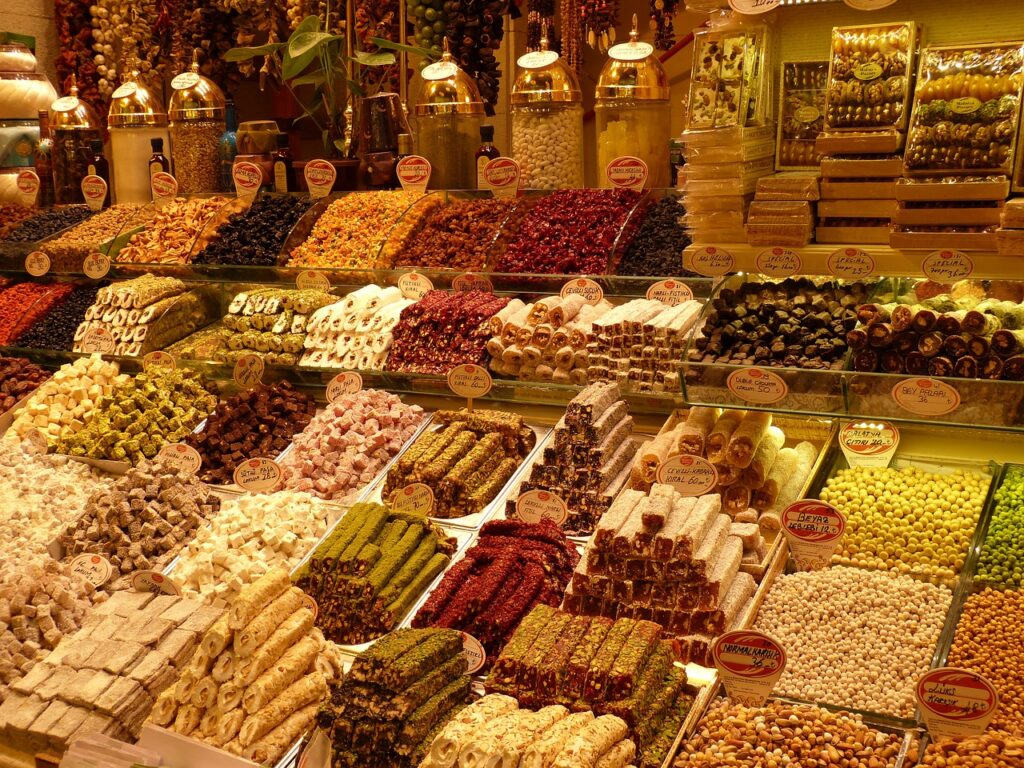



Forget the price tags; here, your negotiation flair is your best weapon.
Imagine trying to snag the last piece of baklava at a family gathering; that’s the energy you need! Turkish vendors expect a bit of playful haggling, a tug of war of prices mixed with warm smiles and maybe even a cup of rich Turkish tea.
The first price? Think of it as the opening act of a great play. Don’t be shy; throw in your counter, maybe share a joke about how this isn’t your first time at the haggling rodeo. And while you might not always snag that rug or lantern at half-price, you’ll walk away with a story, a smile, and perhaps a new friend in the heart of Istanbul.
Remember, it’s all in good fun and very much a part of the vibrant Turkish market culture. That being said, keep in mind the state of Turkey’s economy, and the work they put into making the items they are selling, which are often homemade. The U.S. dollar goes a long way in Turkey, and if you have the extra dollars to spare, don’t try to haggle for the lowest possible price.
8. Public transport is the best option in big cities like Istanbul
Navigating Istanbul, with its sprawling urban expanse, might initially seem daunting, but fear not! The city boasts a remarkably efficient and diverse public transportation system, ensuring you can hop from one iconic site to another with ease.




Whether you’re cruising on the Bosphorus via a ferry, speeding underground on the metro, gliding above streets on trams, or zigzagging through neighborhoods on buses, Istanbul offers it all.
For those on the move, the Istanbulkart is your golden ticket. This nifty prepaid card is like the Swiss army knife of public transport, allowing seamless transitions across the various modes of transportation. Simply top it up at various kiosks or vending machines around the city, and you’re good to go.
Not only is it cost-effective, but it also saves you the hassle of purchasing individual tickets. So, whether you’re headed to Taksim Square or diving deep into the historic quarters, let Istanbul’s public transport whisk you away on a journey of discovery.
9. Try local Turkish cuisine
A culinary journey through Turkey is like flipping through the pages of a rich, aromatic history book. Turkish cuisine is a symphony of flavors and traditions passed down through generations.
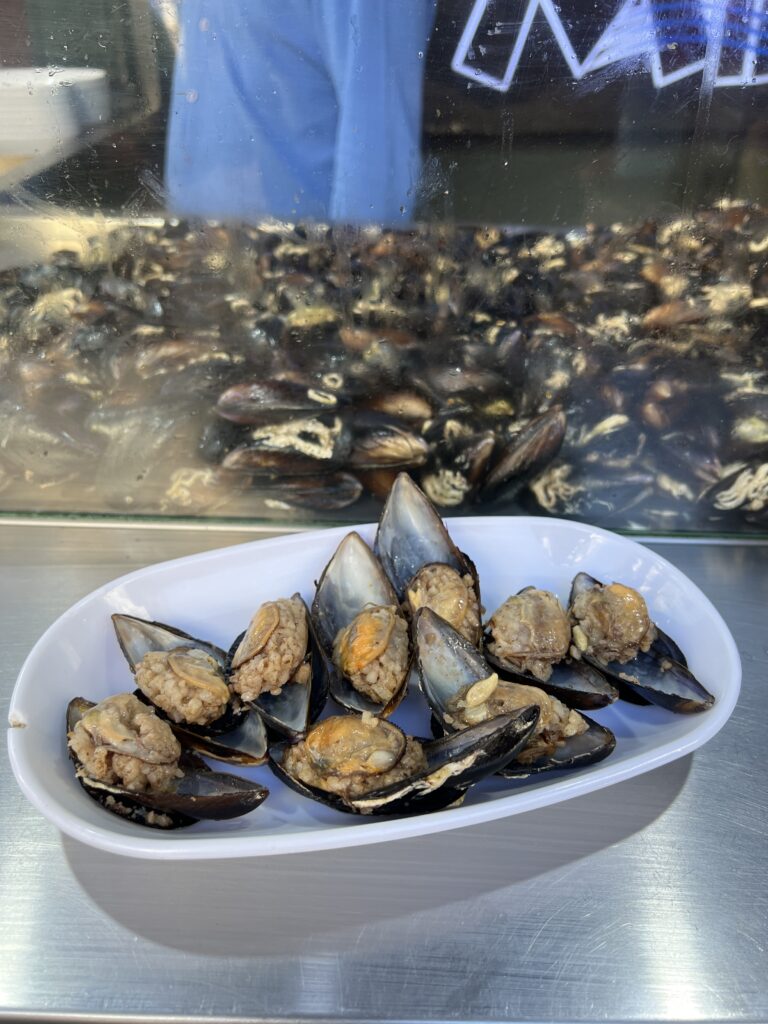



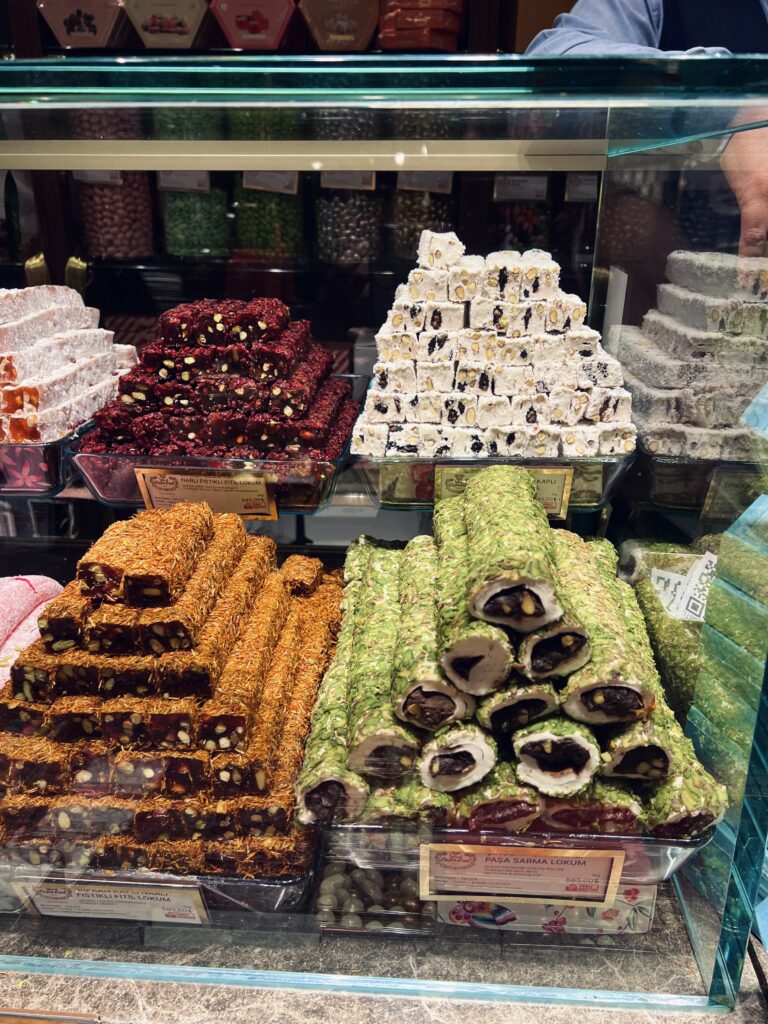



Kebabs, with their perfectly marinated and grilled meats, are a testament to the nation’s mastery over fire and spice. As you walk the bustling streets, the aroma of baklava might beckon—thin pastry layers generously filled with nuts and sweet syrup, ensuring a delightful crunch in every bite.
And Turkish delight – or lokum – offers a soft, chewy experience, often laced with rose or lemon flavors and dusted with icing sugar.
To wash it all down? Nothing beats the robust experience of Turkish tea or coffee. The coffee, thick and strong, often leaves a memorable mark, while the tea, served in tulip-shaped glasses, is a daily ritual. Dive into local restaurants or street food stalls, and let your taste buds embark on a Turkish culinary odyssey.
10. Tipping is not expected (but it is appreciated)
When it comes to showing appreciation in Turkey, tipping, locally known as “bahşiş,” plays a pivotal role. Picture this: you’ve just had a sumptuous meal at a local restaurant, sipping the last drops of your Turkish tea. Now, it’s time to settle the bill.
Tipping, while not obligatory, is a customary gesture to acknowledge good service in restaurants, cafes, and even during taxi rides. Generally, leaving around 5-10% of your total bill is considered polite. If you’ve had an exceptional experience, feel free to tip a bit more. In taxis, rounding up to the nearest lira or simply handing a small note makes the cut.
Remember, it’s not just about the money; it’s a nod of appreciation, a way to say “Teşekkürler” or “Thank you” for the service rendered.
11. Opt for bottled water
When it comes to quenching your thirst in Turkey, going bottled is the best way. While Turkish cities generally have well-treated and chlorinated tap water, the unfamiliar minerals and slight differences in treatment might not sit well with everyone’s stomach, especially those of visitors who aren’t accustomed to it. Even many locals prefer bottled water for drinking purposes.
You’ll find a variety of brands available in supermarkets, convenience stores, and kiosks scattered across streets. If you’re environmentally conscious, consider buying larger jugs of water and refilling a reusable bottle as you go. This not only reduces plastic waste but also ensures you always have fresh water at your disposal.
For those adventurous souls hiking or exploring rural areas, always carry a good supply with you. Remember, it’s not just about thirst—it’s about ensuring you stay hydrated and healthy during your Turkish escapade.
12. Know which adapters you need




If you’ve got a myriad of gadgets to charge or hair tools to plug in, here’s your electrical primer for Turkey. The country utilizes the European-style two-pin round plugs, categorized as Type C and Type F.
These plugs are common across many European countries, but it’s always wise to double-check your devices before you travel. With a standard voltage of 220V and a frequency of 50Hz, Turkey is on par with much of Europe.
If your devices aren’t compatible, investing in a universal travel adapter is a smart move. These are readily available at airports or electronic stores. It ensures you can keep your devices juiced up and ready to capture every mesmerizing moment of your journey.
13. Local Time
If you’ve ever wondered where Turkey sits on the world’s time map, the answer lies in the Eastern European Time (EET) zone. This means when you set your watches or reset your phone’s time setting, you’ll be aligning with cities like Bucharest, Athens, and Helsinki.
Operating 3 hours ahead of Coordinated Universal Time (UTC+3), Turkey does not observe daylight saving time. So, whether you’re marveling at the beauty of Cappadocia’s hot air balloons at sunrise or losing yourself in the bustling streets of Istanbul by night, it’s one consistent time throughout the year.
A tip for travelers: Always adjust your devices upon arrival to ensure you’re in sync with local timings, from museum openings to train departures. Time, after all, is of the essence when you’re on an adventure!
14. Shoes Off Indoors
When in Turkey, do as the Turks do—and that often means leaving your shoes at the door! This age-old custom is deeply rooted in Turkish culture. When entering someone’s home, it’s not just about cleanliness but also about respect.
By removing your shoes, you’re honoring the sanctity and purity of the household. If you’re invited to a local’s home (and given the warm Turkish hospitality, there’s a good chance you might be), you’ll often find a lineup of family footwear just outside or inside the entrance. Sometimes, hosts might provide slippers or indoor shoes for guests. It’s a beautiful tradition that showcases the significance of home as a revered space.
As a visitor, always err on the side of respect and assume the “shoes-off” rule applies unless told otherwise. Pro-tip: this makes wearing socks without holes an excellent idea when visiting Turkey!
15. Hamams (Turkish Bath)




For those seeking an authentic Turkish experience that’ll leave you rejuvenated from head to toe, a visit to a Hamam is a must. Descending from the Roman bath culture and infused with Islamic rituals, these traditional Turkish baths are a blend of history, culture, and pure relaxation.
Stepping into a Hamam, you’ll find a central dome under which bathers relax on a heated marble platform, known as the “göbek taşı.” Here, amidst steam and ambient light, you’ll be exfoliated and massaged by attendants, scrubbing away travel fatigue and leaving your skin feeling baby soft. But it’s more than just a spa treatment—it’s a centuries-old social tradition.
Whether you’re in a lavish Hamam in a big city or a modest one in a smaller town, the experience remains deeply rooted in a sense of community and relaxation. Wrap up with a refreshing Turkish tea, and you’ve got yourself an experience of a lifetime!
16. Stray cats are everywhere
Anyone who’s visited Istanbul will affirm: the city is as much a haven for history enthusiasts as it is for cat lovers!
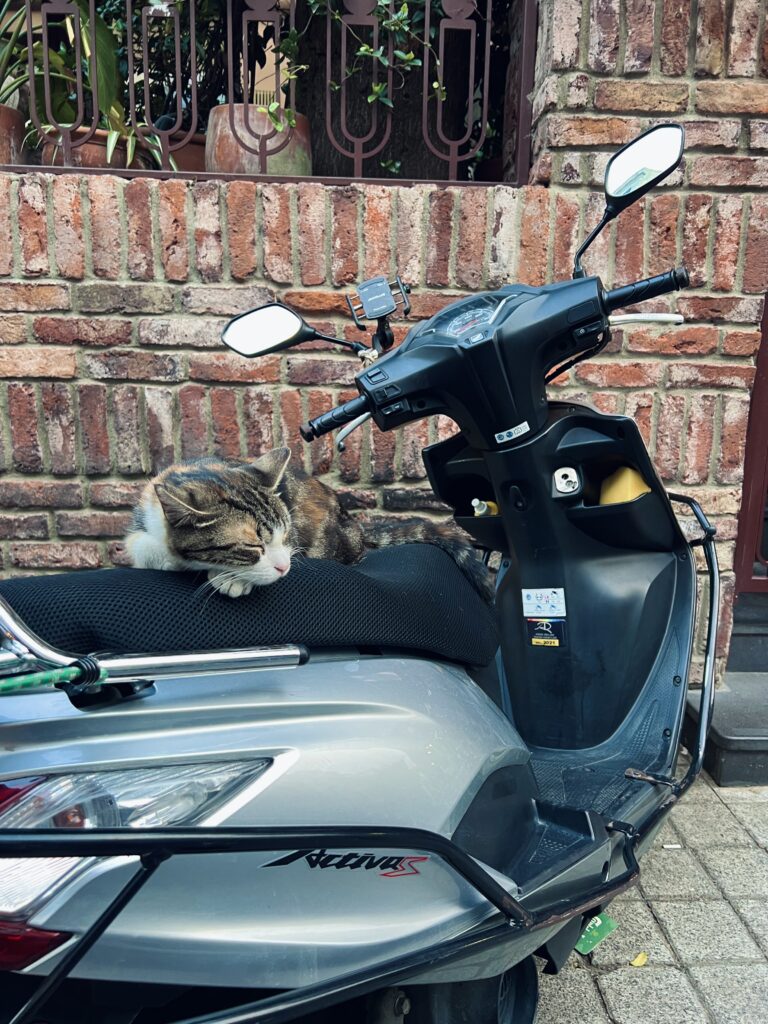



The streets of Istanbul are graced with feline friends that have become an integral part of the city’s charm. Whether lounging by the Hagia Sophia, prowling around the Blue Mosque, or napping in a cozy café corner, these cats are more than just strays—they’re a beloved part of the community.
Local tales often say that these cats are the true “kings and queens” of Istanbul. Residents and shopkeepers alike take pride in feeding them, providing makeshift shelters, and sometimes even setting out beds and toys.
The love affair between Istanbul and its cats is so profound that it’s even inspired a documentary, “Kedi,” celebrating these furry rulers of the city. For travelers, these cats provide not just Instagram-worthy moments but also showcase the heart and soul of Istanbul—a blend of history, culture, and compassionate coexistence.
17. Buy a local SIM Card
Let’s face it: staying connected is a crucial part of our modern travels. Whether it’s navigating the bustling streets with Google Maps, snapping and uploading that perfect sunset shot, or keeping in touch with loved ones back home, a reliable internet connection can be a game-changer.
If your stay in Turkey stretches beyond a fleeting visit, investing in a local SIM card can be both economical and practical. Turkish mobile networks offer impressive coverage, even in remote areas, ensuring you’re never truly “off the grid” (unless you want to be!). Major providers like Turkcell, Vodafone, and Türk Telekom have a variety of prepaid plans to cater to tourists.
Once in Turkey, purchasing and activating a SIM is straightforward and can often be done right at the airport or any mobile store in major cities. With data in hand, you’re all set to dive deep into the Turkish experience without any connectivity woes.
💡 Note: Remember to ensure your phone is unlocked before your journey! If not, you will not be able to use a local Turkish SIM card in your phone.
18. Turkey has many diverse regions
Turkey, in its grandeur, is a mosaic of unique regions, each painting a different story. Beyond the famed domes and minarets of Istanbul lie myriad experiences awaiting intrepid travelers.
Picture the sun-kissed beaches of Antalya, where turquoise waters of the Mediterranean offer solace to sun-seekers. Venture inland to the fairy-tale landscapes of Cappadocia, where ancient rock formations stand tall, often dotted with hot air balloons painting the dawn sky.




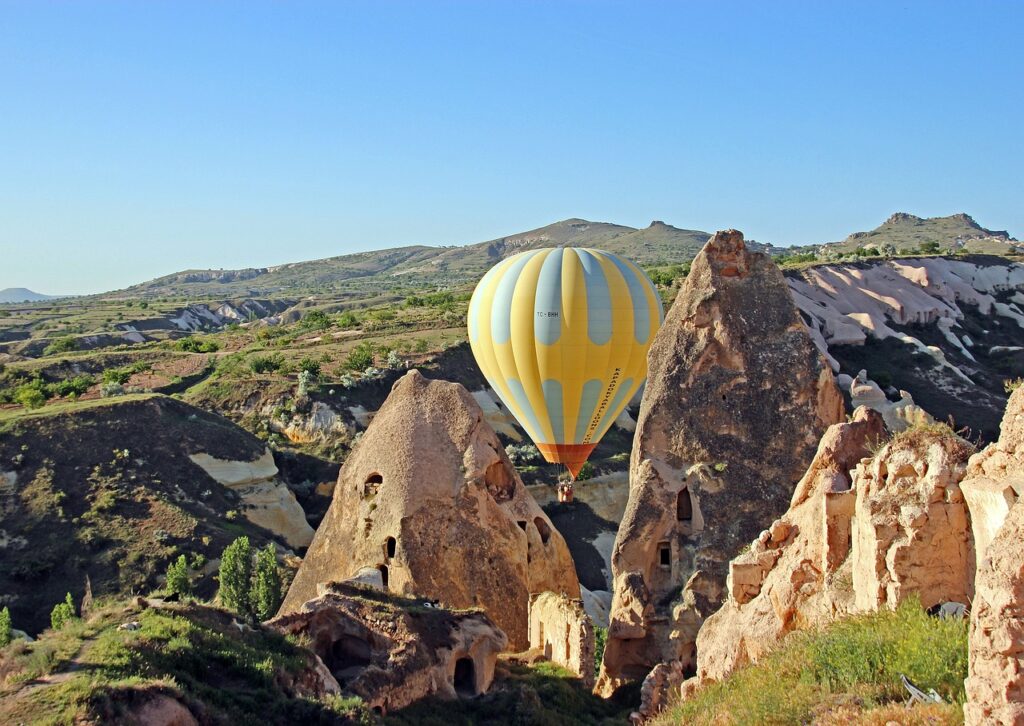



Head further east, and you’ll encounter the rugged beauty of Eastern Anatolia.
Each region, be it the Aegean coast with its ancient ruins and olive groves or the bustling metropolis of Ankara, presents a unique facet of Turkey’s rich history, culture, and natural beauty. So, when planning your Turkish vacation, think beyond the usual and let the country’s diverse regions enthrall your wanderlust.
19. Try Raki, a traditional Turkish drink




Raki is an iconic Turkish spirit that’s as much a drink as it is an embodiment of Turkish conviviality. This anise-flavored alcoholic drink is sometimes called “lion’s milk” and is a popular Turkish spirit. It’s often enjoyed with meze (small dishes) and is typically diluted with water, turning it milky white.
This anise-flavored drink is more than just a beverage; it’s a ritual. Often sipped alongside a spread of meze—delicious small dishes ranging from seafood to fresh salads—it’s an experience that stimulates both palate and conversation. The key to enjoying Raki is to take it slow. Dilute with water, serve it chilled, and savor every sip.
As locals would attest, drinking Raki is about cherishing the moment, the company, and the myriad flavors of Turkish hospitality. So, next time you find yourself in a traditional “meyhane” (tavern) with a glass of Raki in hand, raise a toast to the timeless Turkish tradition of celebrating life’s simple pleasures.
20. Avoid Excessive Public Displays of Affection
While Turkey is a modern country, it’s good to be aware that overt public displays of affection, especially in more conservative regions, can be frowned upon. Turkey, a progressive nation at the crossroads of Europe and the Middle East, has been swaying between its traditional values and global influences.
While it’s not uncommon to see young couples holding hands in Istanbul’s trendy districts or the beach promenades of Bodrum, overt displays of affection, like long embraces or passionate kisses, can raise eyebrows, especially in smaller towns or more conservative regions. This doesn’t mean the Turkish people are cold or indifferent; they are warm-hearted and hospitable. Still, they prefer expressing affection privately.
So, while you’re soaking up Turkey’s rich heritage, it’s wise to keep the public smooches on a low profile and reserve them for more private settings. This small gesture will only enhance your experience and understanding of this beautiful country’s intricate social tapestry.
21. Istanbul is not the capital
While the intoxicating allure of Istanbul often steals the limelight, Ankara, the capital city, has its understated charm and significance. Nestled in the heart of Anatolia, Ankara is a blend of the old and the new.
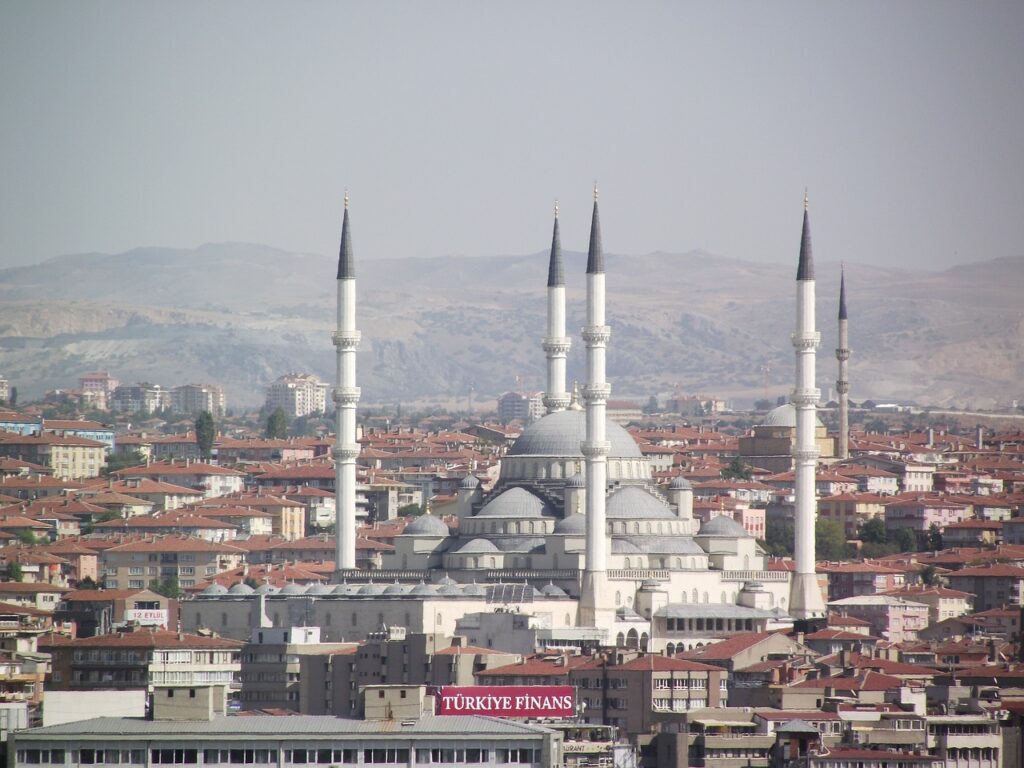



The city has seen civilizations come and go, from the Phrygians to the Romans, leaving their indelible marks. Among its many attractions is the mausoleum of Mustafa Kemal Atatürk, the founder of modern Turkey. Anıtkabir, as it’s called, is not just a historical site but a symbol of the country’s modern aspirations. The Museum of Anatolian Civilizations is another gem, giving visitors a deep dive into the region’s rich history.
But Ankara isn’t just about the past. The city pulsates with a dynamic energy, evident in its bustling markets, contemporary art scenes, and modern architecture. Exploring Ankara gives travelers a more comprehensive understanding of Turkey, showcasing the balance between its illustrious past and its forward-looking future.
22. Respect the dress code
Embracing different cultures often means respecting local norms, and in Turkey, dressing plays a pivotal role, especially when visiting religious or conservative areas. Turkey is predominantly Muslim, and while its cosmopolitan cities showcase a broad range of fashion, traditional values hold strong in its heartland.
When visiting religious sites like mosques, modesty is key. Women are advised to wear long skirts or pants, and it’s customary to cover the head with a scarf. Men should opt for long pants and sleeved shirts.
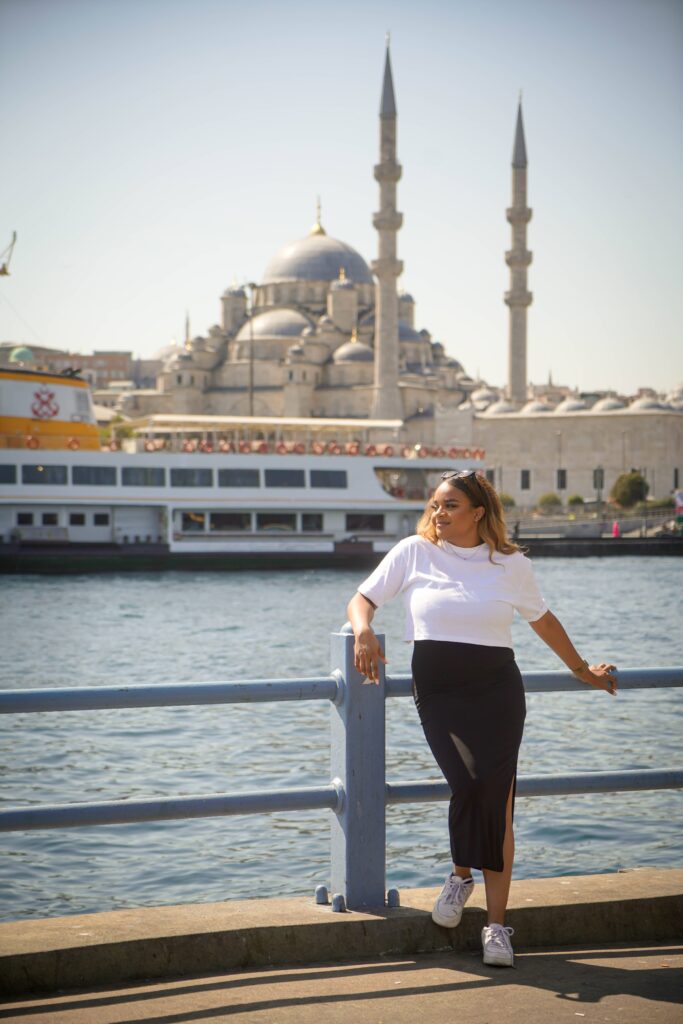



But it’s not just about the religious sites. If you’re venturing into the countryside or lesser-known towns, it’s wise to dress a bit more conservatively to respect local sensibilities. However, in beach resorts or big cities, you’ll find a more relaxed attitude.
Always pack a mix of clothing – from comfortable jeans and tees for urban exploration to modest attire for cultural immersion. Respecting the dress code isn’t just about following rules; it’s about immersing oneself genuinely in the Turkish experience.
23. Beware of the Shoe Shine Scam
Navigating through Turkey’s bustling streets is generally a delightful experience, with warm smiles and rich culture. However, as in many tourist destinations worldwide, there are occasional tricks to watch out for. A quirky one is the “shoe shine scam.”
Picture this: You’re walking, and a shoe shiner in front of you accidentally drops his brush. Being the kind-hearted traveler that you are, you pick it up and hand it back to him. In gratitude, he offers to shine your shoes for free. However, once the deed is done, he might insist on a hefty fee, much to your surprise. It’s essential to stay vigilant and be aware of such subtle cons.
If you encounter this, a polite but firm decline for the shine should suffice. The Turkish people are genuinely warm and hospitable, but as with all popular tourist destinations, it pays to stay alert and aware of common scams.
24. ATMs and Currency Exchange
Money matters when you’re on the go! In Turkey, ATMs are pretty much everywhere, especially in major cities like Istanbul and Ankara. Before embarking on your Turkish adventure, inform your bank to avoid any unexpected account freezes – nobody wants a blocked card while on vacation.
While major credit cards are accepted at many establishments, especially in metropolitan areas, cash is king when you dive deeper into the heart of Turkey. Whether you’re haggling in the Grand Bazaar of Istanbul, buying a handmade souvenir in a smaller town, or indulging in delicious street food, having Turkish Lira on hand is prudent.
Currency exchange offices are common in tourist areas and often offer better rates than airports or hotels. As always, it’s wise to check the current exchange rates and count your change.
25. Preservation of Sites
Turkey is a treasure trove of history, a meeting point of civilizations, from the ancient Hittites to the Byzantines and Ottomans. When you stand before the grandeur of sites like Ephesus or the rock churches of Cappadocia, it’s like stepping into a time machine. These sites, bearing witness to millennia of history, are protected for a good reason.
When visiting, it’s crucial to remember that we are temporary stewards of these wonders. Touching ancient artifacts or climbing on historical structures might seem harmless, but over time, such actions can degrade these treasures. Respect barriers, follow guidelines, and heed the advice of site custodians.
Think of it this way: by preserving today, we ensure that future generations can also marvel at these windows into our shared past. Let’s be responsible travelers and cherish these gifts from antiquity.
Thanks for reading!
Hi, I’m Tiana – founder of and author here at Where Tiana Travels. I’m a 20-something with a love for all things travel, photography, and food. I have been living abroad for the past 5 years and solo traveling the globe in my free time. I created this blog to share my travel stories and inspire other women to go out and see the world. Read more about me here!

